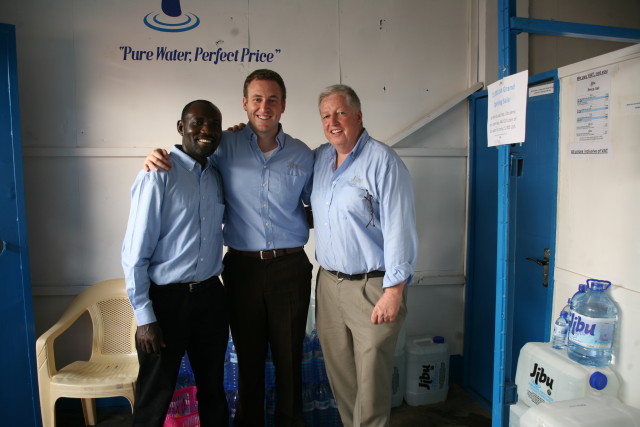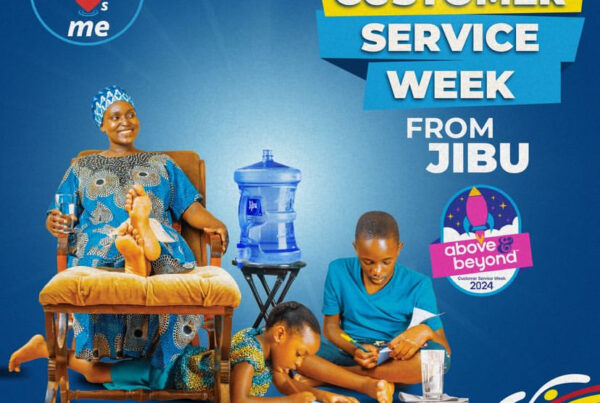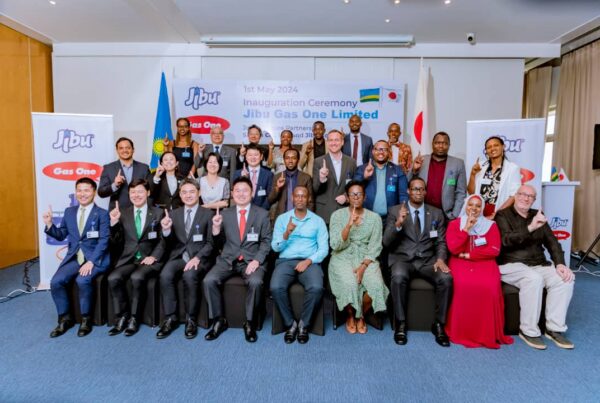“Hello,
After two months in 5 African countries and crossing the equator 12 times, it feels great to be home! I am happy to report that our trip was very successful for the Jibu water franchise project. And Galen and I are very thankful for the tremendous amount of support and encouragement we received from your replies to our last email (re-pasted below). Thanks so much!
Our goal was to launch 5 pilots to stress test our business model on this trip. Two sites are up and running in Uganda. Our one Rwanda site is ready to launch, just waiting for a routine government water safety test result which is expected within days. We are calling this 95% completion. One Congo site is ready to launch except for a (not so routine) signature from the governor of the state, again expected within days. So we are calling this 85% completion. The other Congo site has been forced to be delayed for at least a few months because of challenges our partners are facing on the ground.
So doing the math, I guess our scorecard is currently 3.8 out of 5, with good confidence of reaching 4 out of 5 hopefully within a week. Of course we wish that we had a nice round number like 4 to report right now, but as always want to give you the snapshot of the real, raw data in a timely manner as we evolve. Regardless of not being able to attend two of the grand openings in person, we are super excited about our solid progress on this trip.
You have heard the saying, ‘Give a man a fish and he eats for a day; teach a man to fish and he eats for a lifetime.’ On this trip, we were telling people that we think this saying is misleading. Because what good does it do to teach a man to fish if he can’t afford a fishing pole, bait, etc. to actually catch fish? Our model is packaged for our local partners as an end-to-end ‘business in a box’ that not only teaches a person how to fish, but provides him access to the financial resources and equipment necessary to actually catch fish. And, as an important follow on, to multiply and propagate his success in a way that enables others around him to also catch fish.
Too early to tell if we will be successful long term. But we have enough evidence to suggest that we are definitely on to something! Of course we are adapting constantly and will be modifying many of our procedures and processes moving forward based on learnings from this trip. But we feel confident that our fundamental approach of attempting to move the needle from aid-based development to new types of partnerships between western investors and budding entrepreneurs who own and operate franchise businesses locally shows great promise. Also our goal of creatingself-propagating rather than just sustainable businesses has been incredibly well received on all fronts, especially by the governments of the countries we work in. For example, the vision of our business model helped our partner receive a valuable investment license from the government of Rwanda, which will be a tremendous boon to the business there.
However when viewed as pilots, we are even more bullish and believe we can already celebrate some success. As you may remember, the goal of our pilots was to stress test the limits of our business model in numerous diverse and challenging environments to avoid a ‘false positive’. We designed our metrics to uncover the most reproducible, risk-reduced business model that best positions us for the type of efficient and reliable ’cookie cutter’ growth that an investor would feel comfortable with in our next growth phase when we will attempt to scale the businesses. Most importantly, even if we were to eventually fail in some of our pilots because they proved to be not viable, we engineered them in a way to still contribute to the long term success of the other pilots. If we can learn from our mistakes while small, it helps us avoid the risk of replicating an overly-optimistic or flawed model. We look to launch 100s of these businesses in the years ahead so it is critical to get the blueprint mostly correct now. So no matter what happens from here, we feel validated about our ambitious approach and believe our pilots have been properly designed to yield very helpful predictive data.
Our model appears to have many reproducible strengths. A big key has been to have fantastic and very different types of trusted partners in all of our countries. But here are three of the many challenges to our model we discovered on this trip:
1. Our plastic bottles. We are using existing plastic molds on the market that are workable enough, but not as functional as we would like and don’t sufficiently set us apart from others. Only two of our eight current bottles are clear and returnable, which is a must we have found. The plan has always been to test the market with existing bottles and then design our own more functional and aspirational bottles based on market feedback. But we feel that we need to speed up that process. Finding the right bottle solution using our own mold will be time-consuming and expensive in the months ahead. But it will be a big key to making our prices even lower and our product more attractive to reach our targeted middle/lower class consumers.
2. Government bureaucracy. It is much harder to get the simplest things done in this part of the world than you can imagine.
3. Getting our partners to fully commit to the local neighborhood focus of the business. At this point, we want them to win new business primarily within a 1km radius (about half a mile) around their site, where over 90% of the population cannot afford to drink safe water regularly. Then if successful, replicate launches of 100s of these local neighborhood water depots throughout their region.
Instead they are tempted to follow the more traditional path to sell our water bottles to city-wide retailers, who then mark it up and sell to their current customers who can already afford to buy safe water- but now are happy to get it at a slightly lower price. There is some value to this traditional retail approach because it creates brand recognition on a large scale and an aspirational product that makes the poor want our water. But we see this traditional approach, although probably profitable in the short run, as only secondary and complimentary to the direct-to-the-local-consumer approach that is at the heart of our model. And it potentially increases our risk, because actually we are trying to keep a low profile while we are working out the kinks in our implementation in the next few months to avoid the possibility of getting hurt by hostile external forces.
We believe our local neighborhood focus will be more profitable (and far more charitably impactful!) in the long run because of the millions of new customers who would then be able to afford safe water. And also we can’t realistically compete directly with existing big water bottlers like Dasani (a Coke product), but must take an asymmetric approach that changes the game to reach a whole new set of customers who are currently shut out of the safe water market. So it becomes a matter of us trying to keep our partners’ eyes on the bigger prize, which is to launch a whole pile of these businesses in the coming years to reach the vast masses of unreached water customers.
You don’t need a Facebook account! to see more pictures and our blog at https://www.facebook.com/JibuCo. You can also visit our website at www.jibuco.com below to find out more if you are new to Jibu.
Most fondly,
Randy Welsch”







Do you have ongoing projects in Kenya?